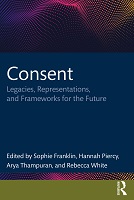Chapter 11 ‘I wasn’t aware at the time, I could actually say “no”’
Proposal review
Author(s)
Donovan, Catherine
Butterby, Kate
Barnes, Rebecca
Language
EnglishAbstract
Drawing on interview data collected in three projects exploring domestic abuse in LGB and/or T+ people’s intimate relationships, this chapter examines sexual consent in LGB and/or T+ people’s abusive relationships through a queer lens. Three themes are considered. First, Catherine Donovan and Marianne Hester’s two ‘relationship rules’ underpinning abusive relationships are applied. These determine that the relationship is for the abusive partner and on their terms; and that the victim/survivor is responsible for everything, including their partner’s abusive behaviour. Participants’ accounts show how these relationship rules can delegitimate victim/survivors’ attempts to exercise consent and conversely legitimate non-consensual sex. Second, Carole Pateman’s ‘sexual contract’ is drawn upon to demonstrate how abusive partners mandate sex whenever and however they wish, while victimised partners feel duty-bound to acquiesce. This, it is argued, reproduces cis-heteronormative sexual scripts based on public stories about love and intimacy and conventionally gendered binaries such as initiator/follower. Third, accounts demonstrating how more experienced LGB and/or T+ partners can exercise experiential power to instil norms about sex and intimacy are analysed. It is concluded that these abusive practices frame the context in which sexual victimisation occurs in LGB and/or T+ people’s intimate relationships and inhibit victims/survivors from recognising and naming sexual violence.


 Download
Download